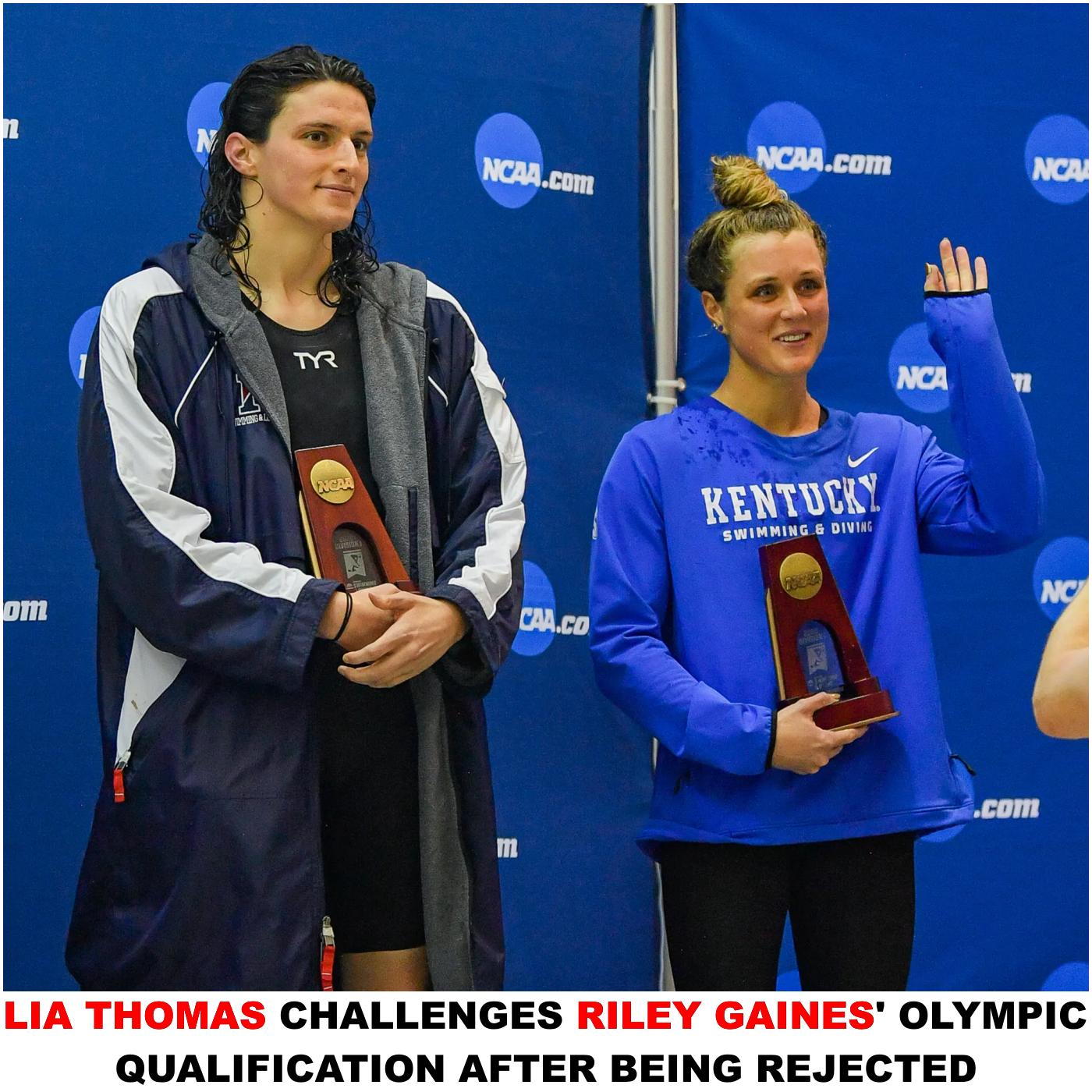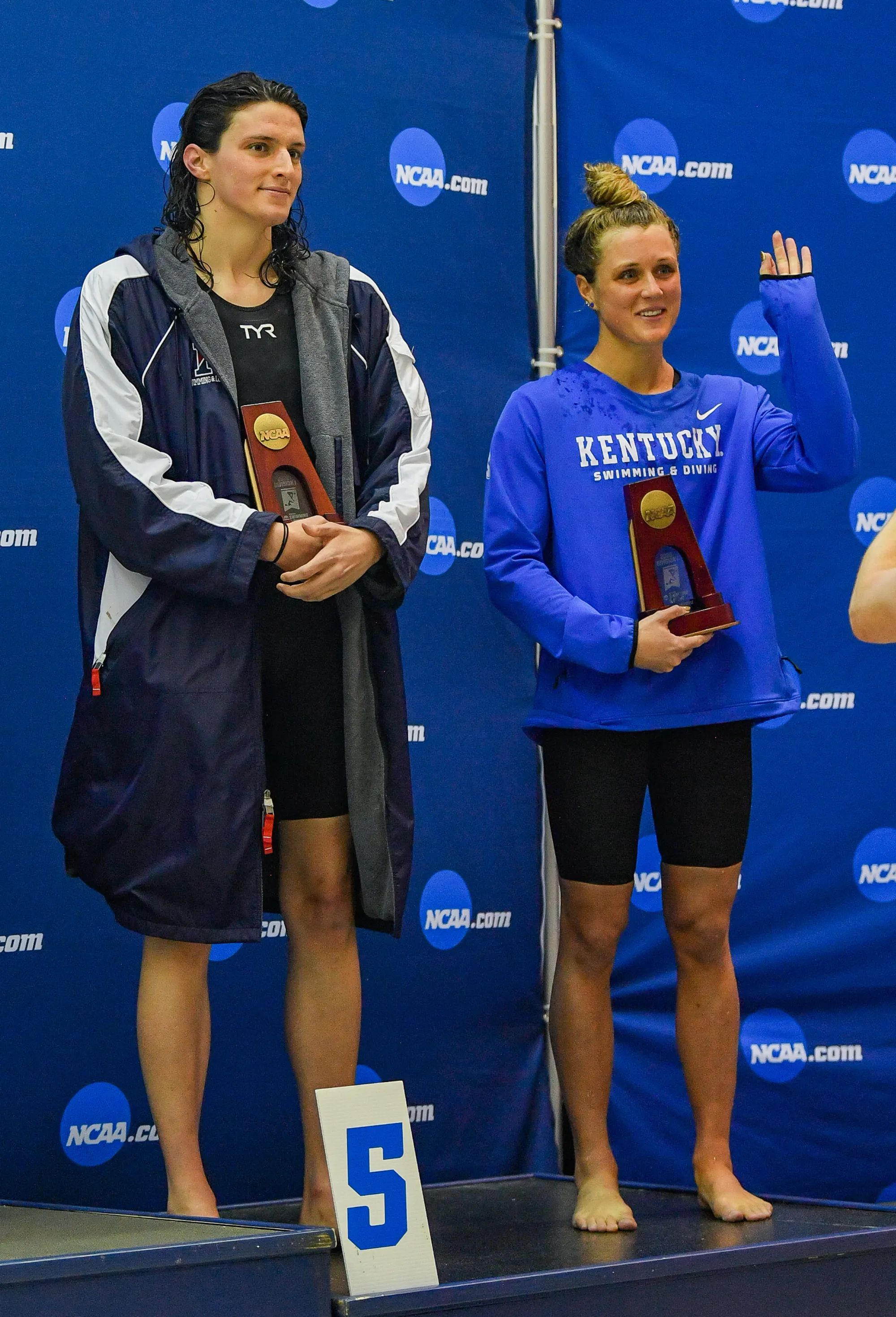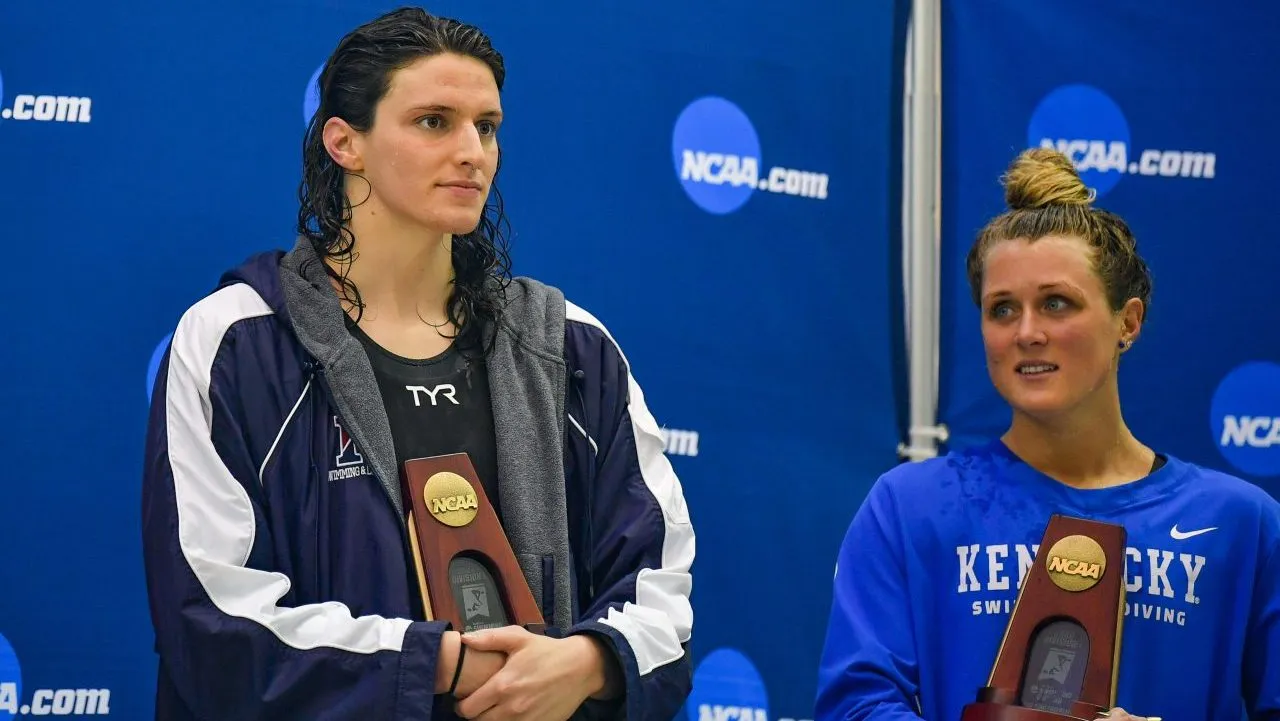
In a bold and emotional statement, Lia Thomas, the transgender swimmer who has been at the center of intense debates in the world of competitive swimming, has challenged Riley Gaines’ Olympic qualification. After being rejected from the opportunity to compete, Thomas asserted, “I’m a woman too,” highlighting the ongoing controversy surrounding transgender athletes in sports.

Lia Thomas first gained widespread attention when she transitioned and began competing in the women’s division, having previously swum for the University of Pennsylvania men’s team. Her participation ignited a fierce debate about fairness, inclusion, and the definition of gender in competitive sports. Despite her achievements in the pool, including winning the 500-yard freestyle at the NCAA Division I Women’s Championships, Thomas has faced relentless scrutiny and backlash.
The latest chapter in Thomas’s journey involves her challenge to Riley Gaines’ qualification for the Olympic team. Gaines, a standout swimmer known for her exceptional performances, secured her spot on the U.S. Olympic team amidst the backdrop of this heated debate. Thomas’s rejection from the opportunity to compete on the same stage has raised significant questions about the criteria and policies governing transgender athletes in the Olympics.
In her public statement, Thomas expressed her frustration and disappointment. “I have worked tirelessly, just like any other athlete, to earn my place in the sport I love. To be told I cannot compete because I am transgender is deeply hurtful. I am a woman too, and I deserve the same opportunities,” Thomas stated.
Thomas’s challenge is not just a personal battle; it is emblematic of a broader struggle faced by many transgender athletes who seek recognition and inclusion. Advocates for transgender rights argue that denying athletes like Thomas the opportunity to compete is discriminatory and undermines the principles of equality and fairness that sports are supposed to uphold. They emphasize that inclusion should be the guiding principle, allowing all athletes to participate based on their gender identity.
On the other side, critics argue that allowing transgender women to compete in women’s categories may provide them with an unfair advantage, citing biological differences that could impact performance. This perspective has fueled calls for the development of more nuanced policies that can balance fairness with inclusivity, ensuring that all athletes have a fair shot at success.
The International Olympic Committee (IOC) has been grappling with these complex issues, attempting to create guidelines that address both the concerns of fairness and the rights of transgender athletes. The current policies require transgender women to maintain certain testosterone levels for a specified period before competition. However, these guidelines remain contentious and are subject to ongoing review and debate.
Riley Gaines, in response to Thomas’s challenge, has maintained her focus on her preparation for the Olympics. “I respect Lia’s journey and her right to compete, but my focus remains on representing my country to the best of my ability. This is an incredibly complex issue, and I trust the authorities to navigate it fairly,” Gaines remarked.
The dialogue surrounding Lia Thomas’s challenge has sparked widespread discussion about the future of sports and the inclusion of transgender athletes. Prominent voices in the sports world have weighed in, with some advocating for greater inclusivity and others emphasizing the need for fair competition.
As the conversation continues, it is clear that the path forward will require thoughtful consideration and collaboration among athletes, policymakers, and advocacy groups. The goal should be to create an environment where all athletes feel valued and respected, and where the integrity of competition is maintained.
In conclusion, Lia Thomas’s challenge to Riley Gaines’ Olympic qualification underscores the ongoing and complex debate about transgender athletes in sports. Thomas’s assertion, “I’m a woman too,” is a powerful reminder of the need for policies that recognize and respect the identities of all athletes while ensuring fair competition. As the sports world grapples with these issues, the hope is that a balanced and inclusive approach can be found, allowing all athletes to pursue their dreams and excel in their chosen fields.
In a passionate statement, Riley Gaines has taken a strong stance against Brittney Griner for her decision to kneel during the National Anthem. Gaines, known for her outspoken views on patriotism and respect for the flag, did not hold back in her criticism of Griner’s actions.

During a recent public appearance, Gaines addressed Griner directly. “You don’t have to sing or anything,” she stated, “but you need to show some respect for the country that saved you from a Russian Gulag.” Gaines was referring to Griner’s high-profile detention in Russia, which garnered significant media attention and diplomatic efforts for her release.
Gaines continued her critique by emphasizing the importance of honoring the flag and the National Anthem. “Disrespecting the flag is like spitting on the graves of those who died protecting it,” she asserted. Her words resonated with many who share her views on patriotism and the symbolic significance of the National Anthem.
Brittney Griner, a professional basketball player, has been a prominent figure in discussions about social justice and protests during the National Anthem. Her decision to kneel has been both praised and criticized, reflecting the broader national debate on the issue.
Griner’s kneeling during the National Anthem is part of a larger movement aimed at drawing attention to racial injustice and inequality. However, her actions have also sparked controversy, with some viewing it as a sign of disrespect towards the flag and the country.
The public reaction to Gaines’ statements has been mixed. Supporters of Gaines have applauded her for speaking out and defending what they see as core American values. “She’s absolutely right,” one supporter commented on social media. “Respecting the flag and those who died for our freedom is non-negotiable.”
On the other hand, critics argue that kneeling during the National Anthem is a peaceful form of protest protected by the First Amendment. “It’s about bringing attention to important issues,” a critic responded. “Kneeling is not about disrespecting the country; it’s about pushing for change.”
The debate over kneeling during the National Anthem continues to be a divisive issue in the United States. Figures like Riley Gaines and Brittney Griner represent the two sides of this debate, each standing firm in their beliefs and actions.
As the discussion around this issue persists, it remains clear that the conversation about patriotism, protest, and respect for national symbols is far from over. Both Gaines and Griner have sparked important dialogues that challenge Americans to think deeply about their values and the ways in which they express them.
In the end, the controversy surrounding Griner’s kneeling and Gaines’ response highlights the ongoing struggle to balance respect for tradition with the pursuit of justice


